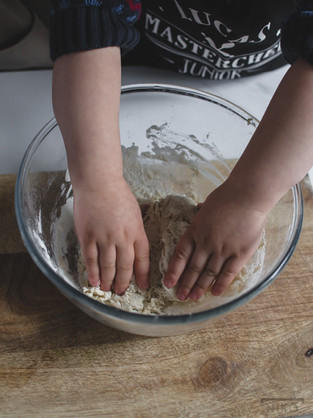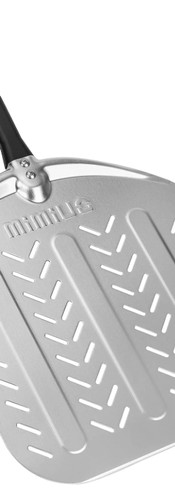Prep: 20 min // Bake: 15 min
A practical guide to making and baking an authentic Neapolitan pizza dough quickly and effortlessly, skipping the waiting time for proving.

On a recent trip to Southern Italy, my friends and I visited a charming agrotourism settlement in the hills of Campania, the birthplace of authentic Italian pizza. We took classes to master the art of traditional pizza-making and returned home eager to get our hands dirty and eat more. However, for a busy family living in a fast-paced megacity, it’s not always easy to find fresh yeast—one of the key ingredients for authentic dough—or convenient to wait for its fermentation.
The traditional fresh yeast method requires at least a 6-8 hour fermentation to give your pizza base its distinct flavor, chemistry, and bubbly, fluffy texture. After experimenting a bit, I came up with this ultra-fast method to make authentic Italian pizza dough in about 30 minutes. While the results won’t be as impressive as a long-fermentation Neapolitan dough, it’s one of the best alternatives for quick, satisfying results.
What’s the secret to a good pizza dough?
The ingredients to a perfectly tasty and authentic Neapolitan pizza recipe are 4:
Strong flour type 00 (used for pasta and pizza)
Fresh yeast
Extra virgin olive oil
Plum tomato sauce, preferably made with San Marzano tomatoes (a plum tomato species which are deliciously juicy and have a robust red colour and a dense texture being nurtured by the rich volcanic soil of Vesuvio and ripen under the Mediterranean sun)
Secret #1: As we cannot achieve fast yeast activation using fresh yeast, we opt for dry. We have 2 types of dried yeast, active dried and fast (or easy) baking. Using active or fresh yeast and shortening the fermentation time because you are in a hurry, will most likely find the yeast being activated in your stomach giving you burns and burpings; not good at all. But fast dried yeast (other commercial names are ‘easy bake’, ‘instant', 'quick yeast’, ‘fast action’) activates much faster and can be used almost instantly.
Secret #2: Flour. Flour type 00 is most commonly used for pizza, a quite strong type of flour, rich in gluten, and used for bakes that require some sort of leavening beforehand, even if this is just 20 min. The strength is measured based on the flour’s capability to absorb water. Lots of pizza makers in Naples use a mixture of 00 and a stronger relative, the Manitoba, to increase the dough strength, i.e. the ability to absorb more water. So the best flour for pizza is a mixture of strong and stronger flours: Type 00 + Manitoba in equal parts.
Absorbing more water means (a) a better ability to retain carbon dioxide and rise when the water reacts with yeast during proving (see the ‘Yeast’ section) and (b) the moister the dough the better for conventional oven pizza baking (at home) as you won’t see your dough completely drying out during baking.
Secret #3: Apart from yeast and flour, if you are a serious pizza lover like myself, I recommend getting a pizza baking stone that will give you a nice even-baked and crusty base. And if you are a pizza addict/pizza pro and looking to get to the next level, better check something like a portable Ooni wood-fired oven for your balcony or backyard ;-) and read my "how to make the perfect Neapolitan dough for outdoor oven" masterclass post to up your game.
Recipe
This recipe is mainly focusing on dough making, however, I’m also suggesting a very easy and tasty homemade tomato sauce I like to make. The authentic tomato sauce for pizza comes from these long pointy plum tomatoes ('Pelati' in Italian), the San Maranzo variety, which I recommend for my sauce. Alternatively, there are some great Mutti canned products that you can buy from Amazon, see my recommendations down at the end.
I also suggest hand stretching, it makes a real difference to the feel and texture of your pizza base. Make sure you've cut your nails and check this video with tips for hand stretching:
Ingredients (makes 2 or 3 pizzas)
For the dough:
500g flour type 00
4g (half sachet) fast-action dried yeast
280ml warm water
2 tsp extra virgin olive oil
1 tsp salt
For the tomato sauce:
10-12 fresh basil leaves
1 tsp dried oregano
1 tsp onion granules (optional)
Salt and pepper
For lazy bakers, ditch the sauce recipe and buy a delicious ready-made Mutti pizza sauce
Equipment
Method
If you are using a pizza stone, now is the time to warm it up. The more you warm it, the better it will behave. Turn your oven on at the maximum setting (anything around 285c) and place the stone to preheat. DO NOT use the oven fan function as that would dry the dough.
In a glass, add the fast action dried yeast and a splash of water. Mix with a spoon until it dissolves. Set aside to activate the yeast for 5-8 mins (the yeast should start to bubble).
In a big bowl add the flour with the salt and make a well in the middle. Pour the yeast mix and the olive oil into the well and start mixing with your finger (in a circular motion) by adding water little by little until it starts forming a rough dough. It’s shouldn’t be very soggy, and neither too dry (you need this humidity for a soft crust when you are baking with a regular home oven) so depending on the quality of flour you’re using you might need more or less than 200ml water.
Transfer the dough to a floured surface and knead for 5 minutes until it's smooth and elastic. Split it into two equal-sized balls and set aside to rest until you prepare your toppings and sauce (around 15-20 min).
Make the tomato sauce (or buy ready-made, see my recommendations below): My favourite special sauce is to add 1 can of San Marzano Pelati (plum) tomatoes in my Ninja blender with the rest of the sauce ingredients, and whizz until it’s a smooth pizza sauce. Make a big batch and store it in the freezer. WIll last for months.
It’s time to shape pizzas! I prefer hand stretching the dough ball with your fingers (get these little fingers to join the fun) on a floured surface to about 20cm in diameter. Stretch further, throw in the air to expand (if you got the skills) and press the pizza dough with your fingertips until it is roughly about 25-30cm diameter, indenting a thicker crust around the edges. I like the middle very thin around 2mm and the edges thicker around 5-8mm.
Baking: Not every oven bakes the same so you might need to adjust the timings. This recipe is baking in a conventional home oven (280c).
First-pass: Carefully transfer the stretched dough onto a pizza peel (or use anything that can aid in this purpose) and spread your tomato sauce. Carefully the pizza on the baking stone and bake at the bottom of the oven for an initial 6-8 min. This is done to allow the dough to bake inside out without burning the toppings and the cheese.
Second-pass: Carefully remove from oven (including the stone), add the rest of your toppings and mozzarella and bake on the top shelf for another 6-8 min. Remove from oven, lift to check if you are satisfied with the middle grounds baking and serve.


Shopping List
Measuring Jug: You will need a 1-litre glass jug (so you can warm up water in the oven) or get a Pyrex Jug Set of different sizes which will be useful for other meal preps.
Dough Scraper: You need a dough scraper (like the MasterClass brand) to aid in cutting, scraping, lifting, and shaping the dough.
Pizza stone: pizza stone is the cornerstone of baking at home. And the more you let it het up in the oven, the better the result will be. If you are serious about pizza, I would suggest going for a combined stone+peel set.
Bowls for toppings: I found this 6-pack of enamel bowls the perfect size for the sauce and toppings needed for the 6 pizzas you will make following my recipe. Alternatively, there is a 6 Compartment Trays Detachable Topping Station which has a lid and keeps everything nice and tidy plus it can be stored in the fridge.
Pizza Peel: I recommend a perforated aluminium Pizza Peel because it's lightweight and easy to slide, turn, and retrieve pizzas from your stone without burning your hands taking the stone out. The perforations also mean a perfectly cooked pizza every time as steam can evaporate to reduce sogginess while excess semolina falls away before serving.
Pizza Serving Board: There are quite a few options out there but I prefer the good old rustic looks of a round wooden pizza board.
Pizza Cutter: There are the classic wheel cutters (I like the Boska for the rustic looks and the Oxo good grips for their quality) and there are pizza rocker cutters which will rock your world by being so stylish and cutting straight through like a hot knife through butter.
Flat bottom ladle: this is for equally spreading the tomato sauce over your stretched pie. Get this one with the spout!
All the equipment you need in photos (swipe left - click to buy):






































Μπραβο!!!!
Πολυ χρήσιμες πληροφορίες και εξαιρετική συνταγή!!!